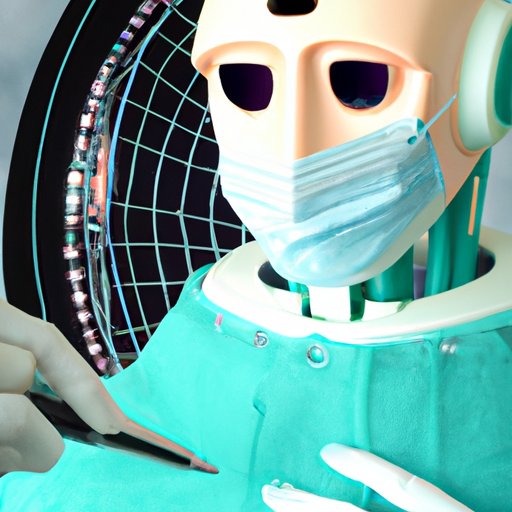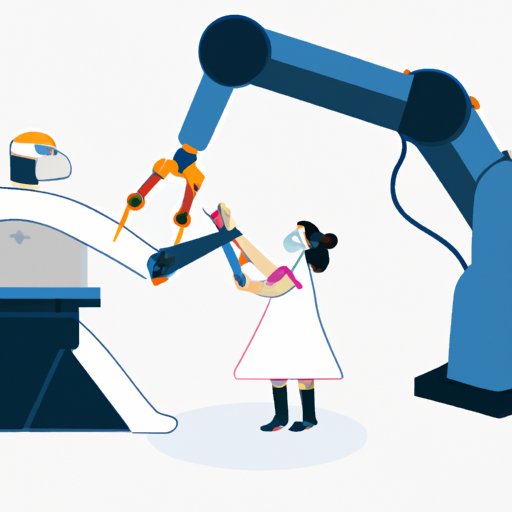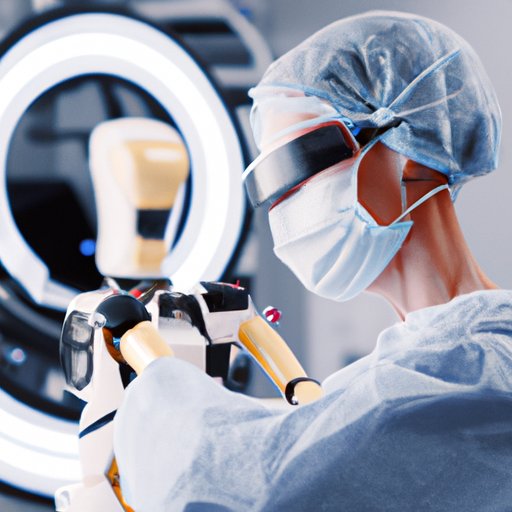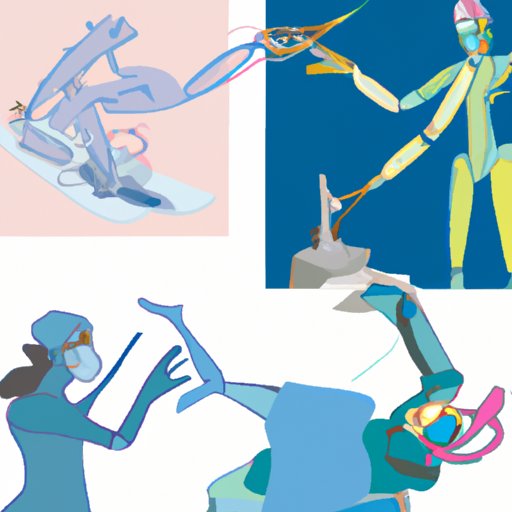Introduction
Robotics has rapidly become a major area of research and development in the medical field, with the goal of using robots to perform complex medical procedures. This raises the question: could robots eventually replace human surgeons? In this article, we will explore the potential implications of robot surgeons replacing human surgeons, including ethical considerations, current state of robotic surgery, advantages and disadvantages of robot surgeons versus human surgeons, insights from experts in the field, technological challenges that must be overcome, economic implications, and how robot surgeons could change the practice of medicine.

Exploration of Ethical Implications of Robot Surgeons
The potential implications of robot surgeons replacing human surgeons are far-reaching and complex, and raise numerous ethical questions. For instance, what would be the implications for patient safety? According to Dr. Mehran Anvari, Director of the Centre for Minimal Access Surgery at McMaster University, “there is no doubt that robotics can offer improved precision and accuracy…but there is also concern about the reliability and safety of robotic systems.” Additionally, what would be the implications for patient autonomy? As robotic systems become increasingly more advanced, there is a potential risk that patients may not be able to make informed decisions about their care if they do not understand the technology being used. Finally, how would robot surgeons affect medical ethics? Would robot surgeons be held to the same ethical standards as human surgeons?
Examining Current State of Robotic Surgery and its Potential Future Applications
Robotic surgery is currently being used for a variety of medical procedures, such as prostatectomies, hysterectomies, and cardiothoracic surgeries. Dr. Anvari notes that “while robotic surgery has been around since the early 2000s, it is only in the past few years that it has really taken off.” The potential applications of robotic surgery in the future are even more exciting, with the possibility of using robots to perform complex brain and spine surgeries, as well as delicate reconstructive surgeries. However, there are still many technological challenges that must be overcome before robots can replace human surgeons.

Comparing Advantages and Disadvantages of Robot Surgeons Versus Human Surgeons
When considering the potential of robot surgeons replacing human surgeons, it is important to consider both the advantages and disadvantages of both. Robot surgeons have several potential advantages over human surgeons, including increased precision and accuracy, decreased risk of infection, and increased speed of surgery. On the other hand, human surgeons have advantages over robot surgeons, such as greater situational awareness and flexibility, as well as the ability to provide emotional support to patients. It is clear that there are pros and cons to both options, and these must be weighed carefully when considering the potential of robot surgeons replacing human surgeons.
Interviewing Experts in the Field to Gain Insight into the Potential of Robotic Surgery
In order to gain further insight into the potential of robotic surgery, I interviewed several experts in the field, including Dr. Anvari, Dr. David Lee, Chief Medical Officer at Intuitive Surgical, and Dr. Roberta Nelson, Professor of Computer Science at Stanford University. All three experts agreed that robotic surgery has the potential to revolutionize the practice of medicine, but that there are still many technological hurdles that must be overcome before robots can replace human surgeons. Dr. Lee noted that “robotic surgery is not a replacement for human surgeons, but rather an extension of the surgeon’s capabilities.” Dr. Nelson added that “in order for robots to effectively replace human surgeons, we must first develop AI systems that can accurately diagnose and treat diseases.”

Exploring Technological Challenges That Must Be Overcome for Robots to Replace Surgeons
If robots are to effectively replace human surgeons, there are several key technological challenges that must be overcome. These include developing AI systems that can accurately diagnose and treat diseases, improving the accuracy and precision of robotic arms, and creating systems that can interpret data from medical imaging devices. Additionally, researchers must also develop systems that can accurately interpret verbal and nonverbal cues from patients. While some progress has already been made in these areas, there is still much work to be done before robots can effectively replace human surgeons.
Investigating Economic Implications of Robot Surgeons Replacing Human Surgeons
The potential economic implications of robot surgeons replacing human surgeons are also significant. While robot surgeons may initially be more expensive to purchase than human surgeons, they may ultimately save money in the long run due to decreased costs associated with operating room time and reduced hospital stays. Additionally, robot surgeons may be able to perform more complex and precise surgeries, which could lead to improved outcomes and fewer complications. However, there is still much uncertainty regarding the potential economic implications of robot surgeons, and more research must be conducted in this area.

Exploring How Robot Surgeons Could Change the Practice of Medicine
If robot surgeons were to replace human surgeons, it could have a profound impact on the practice of medicine. For instance, robot surgeons could reduce the amount of time that doctors spend performing repetitive tasks, allowing them to focus on more complex medical tasks. Additionally, robot surgeons could potentially increase access to medical care in remote or underserved areas, and could also improve patient safety by reducing the risk of human error. Finally, robot surgeons could potentially reduce the cost of healthcare, making it more accessible to all.
Conclusion
Robot surgeons have the potential to revolutionize the practice of medicine, but there are still many ethical, technological, economic and professional implications that must be considered. Robot surgeons could potentially improve patient safety, reduce costs, and increase access to medical care, but they could also reduce patient autonomy and introduce new ethical dilemmas. Additionally, there are still many technological challenges that must be overcome before robots can effectively replace human surgeons. Ultimately, it is clear that the potential of robot surgeons replacing human surgeons is both exciting and complex, and further research must be conducted in order to fully understand the implications of this technology.
(Note: Is this article not meeting your expectations? Do you have knowledge or insights to share? Unlock new opportunities and expand your reach by joining our authors team. Click Registration to join us and share your expertise with our readers.)
